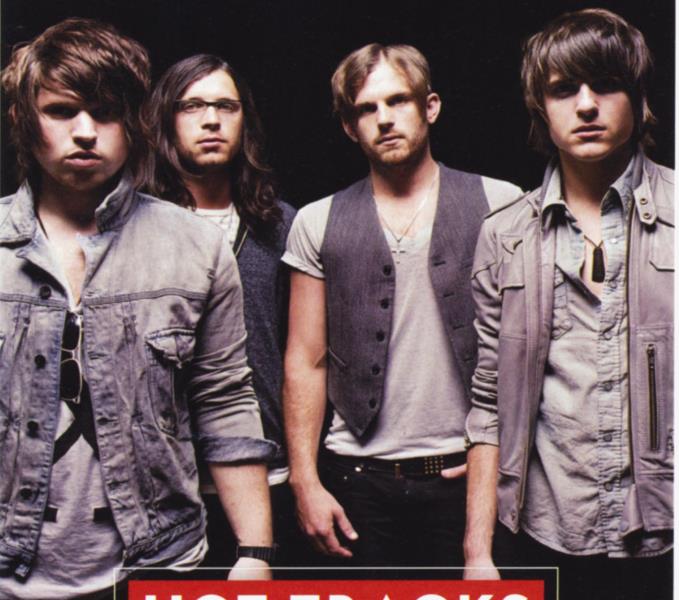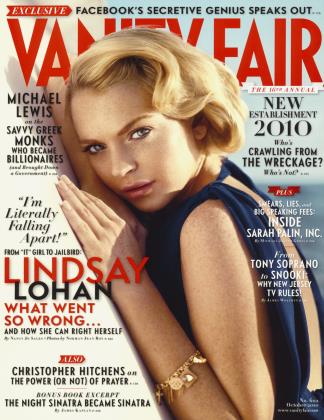Sign In to Your Account
Subscribers have complete access to the archive.
Sign In Not a Subscriber?Join Now"The success of our last record did startle me for a while,” says Caleb Followill, who, with his brothers Nathan and Jared and cousin Matthew, make up the Kings of Leon—the little garage band from a southern, Pentecostal, hard-drinking beginning who, after four albums, have turned into one of the biggest rock and roll bands in the world.
October 2010 Lisa Robinson"The success of our last record did startle me for a while,” says Caleb Followill, who, with his brothers Nathan and Jared and cousin Matthew, make up the Kings of Leon—the little garage band from a southern, Pentecostal, hard-drinking beginning who, after four albums, have turned into one of the biggest rock and roll bands in the world.
October 2010 Lisa Robinson The Kings of Leon, from left: Matthew, Nathan, Caleb, and Jared Followill.
The Kings of Leon, from left: Matthew, Nathan, Caleb, and Jared Followill.
'The success of our last record did startle me for a while,” says Caleb Followill, who, with his brothers Nathan and Jared and cousin Matthew, make up the Kings of Leon—the little garage band from a southern, Pentecostal, hard-drinking beginning who, after four albums, have turned into one of the biggest rock and roll bands in the world. Here, Caleb talks about the Kings’ past, their current status, and their new album—Come Around Sundown—out October 19.
LISA ROBINSON: Did you really want to be a preacher?
CALEB FOLLOWILL: Absolutely. That’s all I knew. My dad was a preacher, all four of my uncles were preachers; it was the highest honor you could have.
L.R. As kids, when you all went on "tour” and sang with your father, was it real revival-meeting stuff ?
C.F. Oh yeah_it was something that would
scare a lot of people away. The women never cut their hair, the men wore long sleeves.... The music was great; loud, fast, definitely soulful—closer to black gospel music. A lot of our inspiration came from that.
L.R. Kings of Leon opened tours for U2, Pearl Jam, and Bob Dylan. You’ve said that U2 and Pearl Jam were very encouraging to you— how was Dylan?
C.F. Cool isn’t a big enough word for how he
was to us—he was amazing. Of all the people
we toured with, he would come and talk to
us the most. He was real sneaky, though—you
could never hear him coming. You would just
smell cigarettes and hear a raspy voice and
turn around and he’d be there.
L.R. How did success change your audience and
the direction of the new album?
C.F. A lot of [them] were just there for the two
songs that they knew from the radio [“Sex on Fire,” “Use Somebody”]. I’d get really drunk onstage and go through the motions. But then I [realized] that now the real challenge for us was to write a record with a little bit of everything from our music, and if they get it they get it, and if they don’t they don’t.
L.R. In this age of iTunes, you still care about albums? C.F. Absolutely. I remember saving up my money, going to the record store, buying a CD, and after 45 minutes of trying to get the motherfucker open, I’d put it on, read every lyric [in the booklet], and immediately feel like it was my record. L.R. Aside from recording in New York City, what did you do differently for this new album? C.F. We just went in there and played; I didn’t even write lyrics on 75 percent of the songs—I just sort of did them off the top of my head.
It has a lot more heart and soul than anything we’ve ever done. We’re finally mature enough that we’re very comfortable in our own skin; we’re not scared of the hipsters or indies... whatever that means. L.R. It means Brooklyn. Oh sorry, you live in Nashville and New York—do you live in Brooklyn?
C.F. No. I’m not cool enough.
 View Full Issue
View Full Issue












Subscribers have complete access to the archive.
Sign In Not a Subscriber?Join Now